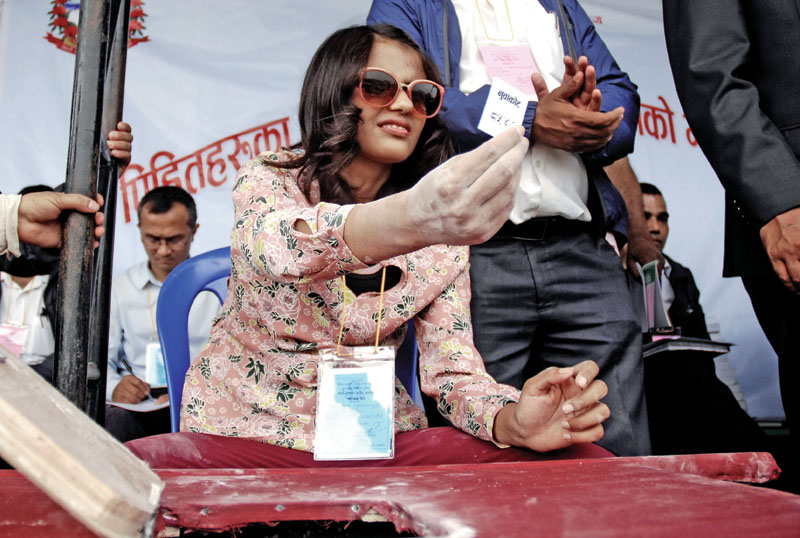Govt’s taxi permit scheme backfires
Kathmandu, July 28
The government’s target to create livelihood opportunities for quake victims by distributing taxi permits seems to have fallen flat, as a large number of such victims, after acquiring the taxi permits, have been transferring the ownership of their cabs immediately after getting it registered with the government office.
Due to their inability to make an investment in purchasing the vehicle, which costs almost Rs 1.6 million, more than 50 earthquake victims who recently acquired taxi permit have already transferred the ownership of their vehicles, according to Bagmati Transport Management Office.
The government had distributed taxi permits to 1,500 earthquake-affected people of the 14 worst-hit districts on June 21. Since then, 100 quake victims who received the permits have registered their cabs at BTMO.
However, due to their failure to withstand financial burden of buying taxis, earthquake victims are searching for investors to purchase the taxi and transferring the ownership of the cab after taking some commission.
As per BTMO officials, new taxi permit acquirers are taking commission amounting to almost Rs 300,000 while transferring the vehicle’s ownership to the actual investor.
However, government officials said they were unable to control the trend of quake victims transferring ownership of taxis, as vehicle ownership transfer was legal.
“Though we have legal provision that one cannot buy or sell vehicle number plates and permits, there is no law that prohibits the acquirer of new taxis from transferring the vehicle’s ownership,” said Basanta Adhikari, head of Small and Big Vehicle Division at BTMO.
Since vehicle ownership transfer is legal, Adhikari said they had only been giving counselling to quake victims who got new taxi permits not to transfer the ownership of their cabs and encouraging them to operate it on their own.
Moreover, Adhikari said BTMO had so far been able to get in touch with only 500 quake victims out of 1,500 who had been granted taxi permits. This only proves that quake survivors did not find the government’s scheme lucrative enough.
Though THT could not independently verify the trend of quake survivors who had won taxi permits transferring their vehicle ownership, Adhikari said such quake survivors had cited weak financial position as the main reason for opting to sell taxis. “Apart from not having necessary resources to buy taxis, they are also unwilling to move to Kathmandu Valley, which is the best market for cabs.”
A majority of quake survivors who were present for the lucky draw to distribute taxi permits a month ago had told THT back then that though they filed applications for lack of better options, such schemes only add to their financial woes.
Interestingly, BTMO officials said a large number of quake survivors who had been granted new taxi permits were aged above 60 — the age-group for which banks and financial institutions are reluctant to issue loans. The Department of Transport Management had sought applications from quake survivors for new taxi permits on the basis of their earthquake victim identity card and most such cards are in the name of elderly.
Government officials themselves say that the government should have introduced customs waiver facilities for such cabs and ensured financial sources to earthquake victims to purchase taxis when the permit scheme was introduced.
Adhikari, admitting that the scheme was launched without enough groundwork, said the government, while launching the scheme, failed to properly disseminate information to quake victims that the government was not giving away free taxis but only free number plates and route permits.
“The scheme received a mammoth 150,000 applications from earthquake victims, as they were misled into thinking that the government was distributing free cabs,” added Adhikari.
What went wrong
- Many quake survivors have transferred ownership of cabs
- Apart from not having necessary resources to buy taxis, they are also unwilling to move to Kathmandu Valley, which is the best market for cabs
- A large number of quake survivors who have been granted new taxi permits are aged above 60 — the age-group for which banks and financial institutions are reluctant to issue loans






